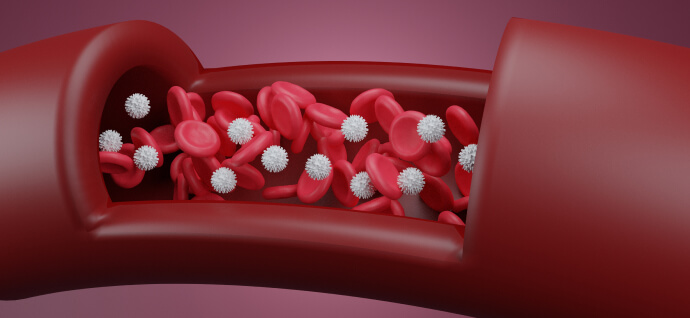We all heard it. “An apple a day keeps the doctors away.” This aphorism originated in a publication in Wales in 1866 to remind the public to stay healthy. [1] People of this time were not particular with doctors and avoided the barbaric medical practice of the 19th and 20th centuries. Over the centuries, the apple has become a symbol of lifestyle choices that lead to health and wellness.[2]
Hundred and fifty years later, we are still passing this message to the next generation. So this begs the question, what’s in the apple that makes it so healthy, and can it really keep the doctors away?
An apple a day makes you live longer
There might be a logical explanation why apples symbolized many things, including immortality in ancient history. A study published by the British Journal of Nutrition found that consuming one apple a day can lower the risk of all causes of mortality by up to 35%.[3]
This seems to be due to the effects of apple consumption on your arteries. Even just a fraction of an apple a day improves blood vessel functions resulting in a 24% decreased risk of having severe major artery calcifications.[4], [5] Artery calcifications are markers of vascular diseases that may lead to heart attack, stroke, and other major hospitalization.

You may think that it is obvious since apples are fruits, of course, they are healthy! However, this is not the case for other fruits such as pears, oranges, and bananas. So what makes apples unique?
Don’t peel the skin
Surprisingly, the apples in the studies are not special. They are not genetically modified or altered in any way. Instead, they are just regular apples from your local market. The secret ingredient is the apple peel itself.
The apple peel contains flavonoids and polyphenols that help regulate cellular activities and fight off free radicals.[6] Essentially these compounds help to protect your body against everyday toxins and stressors.
Various studies have found that flavonoids and polyphenols have potent properties that can prevent cancers and other chronic diseases such as hypertension and type II diabetes.[7], [8], [9] So, before peeling off your apples, you may want to consider the massive nutritional benefit that comes with it.
Effects of unpeeled apples in strength and physique
Regular consumption of unpeeled apples also improves your physique and physical health. Apples can be a great addition to your pre-workout snacks if you are trying to build muscles.[10]

Multiple studies in the labs, both done in animals and humans, have found that the Ursolic acid found in the apple skins significantly affects cell protein activity and cell signaling resulting in overall improvements in physical health and performance.
Here are the known benefits of Ursolic Acids found in apple peels:
Boost muscle growth
In the labs, ursolic acid has been shown to increase mice's muscle mass and strength by enhancing skeletal muscle cells' insulin signaling and reducing the effect of gene expressions associated with muscle atrophy.[11]
Improves muscle recovery

Ursolic acid can effectively decrease the markers of muscle damage during resistance training. This means that supplementation of ursolic acid can improve muscle recovery in the gym and prevent the risk of overuse injury in the long term.[12]
Promotes anti-cancer effects and lowers cholesterol
Multiple cancer types demonstrate abnormally increased cholesterol levels in cancer patients, contributing to the development and progression of cancer cells.
In a study published by the International Journal of Molecular Science, researchers have found that Ursolic Acid can effectively lower blood cholesterol levels and indirectly decrease the progression of cancer growth in the body.[13]

Promotes bone health and fat loss
Even more interesting is the effect of Ursolic acid in preventing bone loss. According to a 2017 study, ursolic acid (UA) showed the same beneficial effects as aerobic and resistance exercises on sarcopenia and obesity.[14] Furthermore, It seems that ursolic acid increases energy expenditure allowing you to burn more fat and calories resulting in fat loss.
Can an apple a day actually prevent physician visits?
Technically no. We all know that a single fruit can not solve every health concern that we have to the point that we would not need a physician ever.
However, it is worth noting that a study found that people who eat an apple a day appear to use fewer prescription medications in their lifetime. In addition, people who include apples in their everyday diet save at least $228 annually in the cost of prescription medications.[15]

Moreover, the same study estimated that if every average American adult included an apple a day in their diet, this would result in a net savings of $19.2 billion annually.[15]
What type of apple is good for your health?
All types of apples are nutritious. The nutritional variation between the varieties of apples is small. It all comes down to your budget and preference.
An average size Smith apples have the highest content of ursolic acid (0.82.mg/cm2), followed by Fuji (0.77mg/cm2), Granny Smith (0.49 mg/cm2), Gala (0.21 mg/cm2).[16]
Conclusion
An apple a day may not keep the doctors away, but it might keep the pharmacists away.
The result of the studies supporting the benefits of including apples in one’s diet is astonishing, especially since apples are whole foods and not an expensive supplement. Furthermore, apples are cheap and can be found in almost any grocery store worldwide. This could translate into a natural and low-cost method of reducing the medical risk profile of the general population.

The flavonoids and ursolic acid in the apple skin make the fruit nutritious and potent at combating chronic diseases. Moreover, ursolic acid mimics the effects of exercise and improves muscle growth.
References
- Phillips, J. P. (1866). A Pembrokeshire proverb. Notes queries, 127, 153. https://scholar.google.com/scholar_lookup?title=A%20Pembrokeshire%20proverb.&author=JP%20Phillips&publication_year=1866&journal=Notes%20queries&volume=127&pages=153
- Centers for Disease Control and Prevention. (2017). “National health and nutrition examination survey”. https://www.cdc.gov/nchs/nhanes/index.htm
- Hodgson, J., et al. (2016). Apple intake is inversely associated with all-cause and disease-specific mortality in elderly women. The British journal of nutrition. 115(5). 860-867. https://doi.org/10.1017/S0007114515005231
- Bondonno, C. (2012). Flavonoid-rich apples and nitrate-rich spinach augment nitric oxide status and improve endothelial function in healthy men and women: a randomized controlled trial. Free radical biology & medicine, 52(1), 95-102. https://doi.org/10.1016/j.freeradbiomed.2011.09.028
- Bondonno, N., et al. (2016). Fruit Intake and Abdominal Aortic Calcification in Elderly Women: A Prospective Cohort Study. Nutrients, 8(3), 159. https://doi.org/10.3390/nu8030159
- Boyer, J., & Liu R. (2004). Apple phytochemicals and their health benefits. Nutrition journal, 3,5. https://doi.org/10.1186/1475-2891-3-5
- Abotaleb, M., et al. (2018). Flavonoids in Cancer and Apoptosis. Cancers, 11(1), 28. https://doi.org/10.3390/cancers11010028
- Al-ishaq, R., et al (2019). Flavonoids and Their Anti-Diabetic Effects: Cellular Mechanism and Effects to Improve Blood Sugar Levels. Biomolecules, 9(9), 430. https://doi.org/10.3390/biom9090430
- Clark, J., et al. (2015). Efficacy of flavonoids in management of high blood pressure. Nutrition reviews, 73(12), 799-822. https://doi.org/10.1093/nutrit/nuv048
- Joy, J., et al. (2016). Ancient peat and apple extracts supplementation may improve strength and power adaptations in resistance trained men. BMCC complementary and alternative medicine, 16, 224. https://doi.org/10.1186/s12906-016-1222-x
- Kunkel, S., et al. (2011). mRNA Expression Signatures of Human Skeletal Muscle Atrophy Identify a Natural Compound that Increases Muscle Mass. Cell Metabolism, 13(6), 627-638. https://doi.org/10.1016/j.cmet.2011.03.020
- Bang, H., et a;. (2017). Ursolic acid supplementation decreases markers of skeletal muscle damage during resistance training in resistance-trained men: a pilot study. The Korean journal of physiology & pharmacology: official journal of the Korean Physiological Society and the Korean Society of Pharmacology 21(6), 651-656 https://doi.org/10.4196/kjpp.2017.21.6.651
- Kim, G., et al. (2019). Ursolic Acid Suppresses Cholesterol Biosynthesis and Exerts Anti-Cancer Effects in Hepatocellular Carcinoma. International journal of molecular sciences, 20(19), 4767. https://doi.org/10.3390/ijms20194767
- Katashima, C., et al. (2017). Ursolic acid and mechanism of action on adipose and muscle tissue: a systematic review. Obesity reviews: an official journal of the International Association for the Study of Obesity, 18(6), 700-711. https://doi.org/10.1111/obr.12523
- Davis, M., Bynum, J. & Sirovich, B. (2015). Association between apple consumption and physician visits: appealing the conventional wisdom that an apple a day keeps the doctor away. JAMA internal medicine, 175(5), 777-783. https://doi.org/10.1001/jamainternmed.2014.5466
- Frighetto, R., et al. (2008). Isolation of ursolic acid from apple peels by high speed counter-current chromatography. Food Chemistry, 106(2), 767-771. https://doi.org/10.1016/j.foodchem.2007.06.003


